

The Journal gives a weekly update on events in our English apple orchards, using pictures and video clips to follow seasonal activities and giving the consumer a level of detail not available from any other source.
All aspects of growing, harvesting, storage, grading, packing and marketing are included enabling consumers to understand the challenges English growers face in supplying our sophisticated market place.
![]() My Dear readers, my sincere apologies, but due to unforeseen circumstances I am not able to publish my English Apple Man Journal for this week!
My Dear readers, my sincere apologies, but due to unforeseen circumstances I am not able to publish my English Apple Man Journal for this week!
I am okay but struggling with other issues leaving me unable to devote enough time to concentrate on the detail required!
It has been a bit disjointed this week, as I planned to join my many friends in the apple & pear community for the BAPL Research Day on Tuesday. On Monday I accompanied my wife for a pre-op consultation prior to a planned (in the near future) Cataract operation.
But, the Consultant who my wife described as "wonderful" threw a small spanner in the works when he said; "I can do it tomorrow"
Well, what could I do but agree! The appointment was 3.15pm on Tuesday! There goes my visit to BAPL event, but then I realised I could attend the morning session, leave at lunchtime and be home well before our journey to Benenden Hospital.
The cataract operation went well, and now I'm trying to balance my available time!
Below: Tuesday 10th February - British Apples & Pears Limited (BAPL) R&D meeting 2026
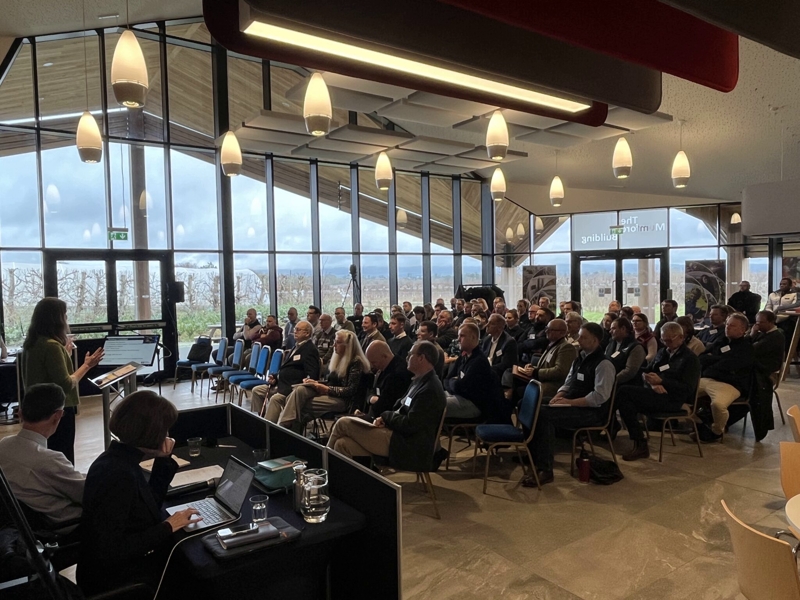
British Apples & Pears Limited (BAPL) R&D meeting 2026 message from Ali Capper CEO BAPL
"With colleagues from Niab, the BAPL research and development team hosted a full day of presentations from researchers and experts to share the latest in crop protection technologies and approaches. More than 80 people joined in person, with a further 150 people joining via the live online webinar".
The meeting took place in Kent on 10th February 2025 and was open to members of BAPL who pay a levy to support this vital R&D work, as well as other interested parties and colleagues from Niab.
![]() With my busy week and additional workload (looking after the 'patient' administering eye drops 4 times a day etc.) I will leave additional coverage of the BAPL day until next weeks Journal!
With my busy week and additional workload (looking after the 'patient' administering eye drops 4 times a day etc.) I will leave additional coverage of the BAPL day until next weeks Journal!
This week's Journal will touch on the recent events going on now, and in the near future!
Next Tuesday 10th February the BAPL / NIAB apple and pear event takes place
The recent Fruit Logistica in Berlin
The Next Generation Fruit Group are on the way home from their visit to South Africa
British Apples & Pears Limited (BAPL) has secured funding worth £200,000 for two new applied research projects through the ADOPT programme, strengthening the organisation's grower-led research and development work aimed at improving sustainability, resilience and productivity in all commercial UK apple orchards.
The funding provides a significant boost to the research programme already supported by British apple and pear growers through BAPL's voluntary levy, allowing the organisation to expand the scope of its work and accelerate delivery of practical solutions for the sector.
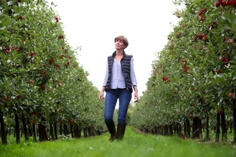 "To secure not one, but two Innovate UK grants for this valuable research is fantastic news." Explained Ali Capper, executive chair of BAPL. "This significantly amplifies the scope of our work and brings real tangible benefits to growers, with evidence-based insights on how growers can reduce conventional fertiliser use and use new soil amendments to improve orchard performance and sustainability.
"To secure not one, but two Innovate UK grants for this valuable research is fantastic news." Explained Ali Capper, executive chair of BAPL. "This significantly amplifies the scope of our work and brings real tangible benefits to growers, with evidence-based insights on how growers can reduce conventional fertiliser use and use new soil amendments to improve orchard performance and sustainability.
The projects are vitally important for the continued growth of our sector."
British Apples and Pears (BAPL) our apple and pear industry promotional body, has long history of supporting the 'top fruit' industry, but in the last decade has progressed under the influence of CEO Ali Capper into a much broader organisation, delivering much more than public promotion. Now research, etc.
The latest addition to the spectrum of BAPL industry support is the introduction of practical workshops.
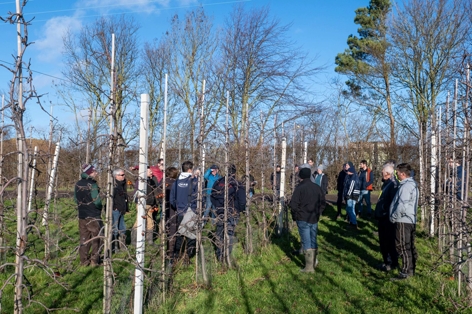 In a conversation last week, Ali Capper updated me on the inspiration she had for introducing practical workshops to the services BAPL provides for it's grower members.
In a conversation last week, Ali Capper updated me on the inspiration she had for introducing practical workshops to the services BAPL provides for it's grower members.
Noting that similar organisations in the world, New Zealand, Australia, USA organise practical activities for their members, Ali has added: Practical Workshops to BAPL activities!
Below: Tom Hulme, Paul Hamlyn & Russell Graydon
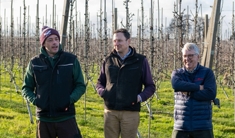
This week, The English Apple Man explores the changes happening in fruit choices, varietal changes and packaging improvements
 Apple growers in Japan's Aomori prefecture have turned to peaches to help manage the effects of climate change.
Apple growers in Japan's Aomori prefecture have turned to peaches to help manage the effects of climate change.
Peach production almost doubles as growers diversify to manage rising temperatures
According to a report from The Japan Times, the climate in the region has changed, with higher temperatures affecting certain apple varieties. One grower noted early-season varieties were affected in particular.
"I think everyone has noticed that these varieties no longer suit the climate here," said a 47-year-old farmer in Hirakawa in the prefecture," said 47-year-old Hirakawa grower Ono
As I write this week's English Apple Man Journal, The Oxford Farming Conference is drawing to an end
This annual event is an important event where all factions of British Farming are represented. In this Journal The EAM tries to pass on some of the key messages from the Oxford Farming Conference
Now in its 90th year, the Oxford Farming Conference is a key date in the farming calendar. Taking place from January 7-9 at the Examination Schools in the city's historic High Street, the event brings together politicians. industry leaders and farmers to discuss key issues affecting the agricultural sector.
"Growing Resilience", running from 7th to 9th January, will mark an opportunity to celebrate our incredible sector and its ability to adapt to the ever-changing world, the opportunities ahead for current and future generations, and a valued legacy, passed on by previous generations.
OFC states: "We will also reflect on the resilience, strength and significant moments of the OFC over the last 90 years. Looking back to 1936 when OFC was first launched, our motto remains true today as it did all those years ago - to "challenge and inspire", not only those who attend but the wider industry. And we are extremely proud that in recent years we have added "include", highlighting our continued commitment that OFC is welcoming and accessible to all.
As we look to the future with hope and optimism, "Growing Resilience" will allow us to explore what is coming next and how we can ensure that our people, our farm businesses, and our environment continues to grow and develop in a resilient manner
Making her OFC debut, Defra Secretary of State Emma Reynolds will be hoping for a warmer welcome than was meted out to her predecessor Steve Reed last year when she takes to the stage on Thursday.
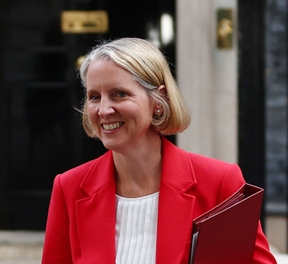 Delivering the keynote address and fresh on the back of the Government U-turn on Inheritance Tax, Ms Reynolds will also take questions from the audience.
Delivering the keynote address and fresh on the back of the Government U-turn on Inheritance Tax, Ms Reynolds will also take questions from the audience.
She will be joined by Jim Fairlie, Minister for Agriculture and Connectivity at the Scottish Government; Welsh Government's Huw Irranca-Davies, Deputy First Minister and Cabinet Secretary for Climate Change and Rural Affairs; and Andrew Muir, Minister of Agriculture, Environment and Rural Affairs, Northern Ireland.
The theme of this year's event is 'Growing Resilience' and there will be appearances from Baroness Minette Batters, following the publication of her Farm Profitability Review and also NFU president Tom Bradshaw.
As we enter a new year, The English Apple Man reports on winter activity on our UK fruit farms with the help of British Apples and Pears 'Orchard watch'
ACH Farming in Kent is taking a bold step for the future of British apples and pears with two major new orchard plantings now under way;
A brand new Jazz orchard is being established, with 20,000 trees planted at 3,077 trees per hectare. This land was growing wheat only last year, so it is a complete transformation into a thriving new top fruit site. These young trees will take around three to four years to reach full production, but the work happening today lays the foundations for years of high quality British fruit.
Next up is a 15 hectare Gala orchard with 46,000 trees soon to be planted. It is a significant investment at a time when the farming climate remains challenging, yet growers like ACH Farming continue to push forwards with long term commitments to British production.
Click on New orchard planting video
Exit after Planting video ends by clicking on facebook X on toolbar

New orchards like these play a vital role in securing more British apples and pears for shoppers in the years ahead. It is long term decisions from growers that support our ambition to reach 60 per cent British by 2035.
Here's to a future full of home grown fruit.
OrchardWatch - British Apples And Pears - Back British Farming - Fruit Growing - Buy British
Just six more days and it will be Christmas
For my wife and I a new adventure as we settle into our retirement apartment, we will probably have a quiet Christmas Day on our own for lunch, and relax in the afternoon.
After more than 60 years of marriage we have enjoyed the full spectrum of Christmas celebrations. In our early years we would spend Christmas Day with either my parents or with my wife's family. Like so many families this changed as we had children and we became the entertainers.
We were fruit farmers, but back then we like many farmers bred Turkeys for Christmas; we produced about 500 and prepared circa 70 for local families. With a growing family, we enjoyed a Turkey Roast on Christmas Day and New Year's Day and plenty of cold turkey sandwiches as well!
This week's Journal is a short one, with an interesting piece published by HortNews about the discovery of an apple thought to be extinct! ;
Today, lunch with a group of six old friends; all but one Octogenarians!
Organised by the youngest in our midst; still in his seventies, we met at The Woodcock Inn at Iden Green near Benenden in West Kent.
Below: The Woodcock Inn
 The Woodcock is a traditional 16th Century Village Inn situated in the heart of Iden Green - Kent within the high weald area of outstanding natural beauty. Almost a year after opening, The Woodcock has encapsulated the old characteristics of the traditional pub with a touch of sophistication in the country! Serving locally sourced fresh, homemade, proper "pub grub". As well as catering for parties and functions of all sizes, from our newly renovated vibrant restaurant, our beautiful garden room and our picturesque beer garden we can cater for all needs.
The Woodcock is a traditional 16th Century Village Inn situated in the heart of Iden Green - Kent within the high weald area of outstanding natural beauty. Almost a year after opening, The Woodcock has encapsulated the old characteristics of the traditional pub with a touch of sophistication in the country! Serving locally sourced fresh, homemade, proper "pub grub". As well as catering for parties and functions of all sizes, from our newly renovated vibrant restaurant, our beautiful garden room and our picturesque beer garden we can cater for all needs.
Alan Wickham initiated our lunch club in early 2025. Alan is an old friend who grew apples and propagated hop plants at his farm near Winchet Hill. Alan is part of the Wickham dynasty of which there are many!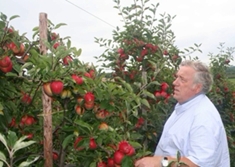
This page initially shows the latest journals. You can use a journal's link to view the full story.
It is now much easier to find a particular journal of interest. Just type your search terms into the search box or select the month and/or year and click Submit.
I have completed the process of reworking my entire archive of journal pages into the style of the new website to make them more accessible to users of mobile phones etc.
Although the content now adapts to the size of the display, some of the archived journals still have photographs that won't fit and so get cropped. Archived journals are best viewed on a computer screen!